- Region
- Águilas
- Alhama de Murcia
- Jumilla
- Lorca
- Los Alcázares
- Mazarrón
- San Javier
-
ALL AREAS & TOWNS
- AREAS
- SOUTH WEST
- MAR MENOR
- MURCIA CITY & CENTRAL
- NORTH & NORTH WEST
- TOWNS
- Abanilla
- Abarán
- Aguilas
- Alamillo
- Alcantarilla
- Aledo
- Alhama de Murcia
- Archena
- Balsicas
- Blanca
- Bolnuevo
- Bullas
- Cañadas del Romero
- Cabo de Palos
- Calasparra
- Camping Bolnuevo
- Campo De Ricote
- Camposol
- Canada De La Lena
- Caravaca de la Cruz
- Cartagena
- Cehegin
- Ceuti
- Cieza
- Condado de Alhama
- Corvera
- Costa Cálida
- Cuevas De Almanzora
- Cuevas de Reyllo
- El Carmoli
- El Mojon
- El Molino (Puerto Lumbreras)
- El Pareton / Cantareros
- El Raso
- El Valle Golf Resort
- Fortuna
- Fuente Alamo
- Hacienda del Alamo Golf Resort
- Hacienda Riquelme Golf Resort
- Isla Plana
- Islas Menores & Mar de Cristal
- Jumilla
- La Azohia
- La Charca
- La Manga Club
- La Manga del Mar Menor
- La Pinilla
- La Puebla
- La Torre
- La Torre Golf Resort
- La Unión
- Las Palas
- Las Ramblas
- Las Ramblas Golf
- Las Torres de Cotillas
- Leiva
- Librilla
- Lo Pagan
- Lo Santiago
- Lorca
- Lorquí
- Los Alcázares
- Los Balcones
- Los Belones
- Los Canovas
- Los Nietos
- Los Perez (Tallante)
- Los Urrutias
- Los Ventorrillos
- Mar De Cristal
- Mar Menor
- Mar Menor Golf Resort
- Mazarrón
- Mazarrón Country Club
- Molina de Segura
- Moratalla
- Mula
- Murcia City
- Murcia Property
- Pareton
- Peraleja Golf Resort
- Perin
- Pilar de la Horadada
- Pinar de Campoverde
- Pinoso
- Playa Honda
- Playa Honda / Playa Paraíso
- Pliego
- Portmán
- Pozo Estrecho
- Puerto de Mazarrón
- Puerto Lumbreras
- Puntas De Calnegre
- Region of Murcia
- Ricote
- Roda Golf Resort
- Roldan
- Roldan and Lo Ferro
- San Javier
- San Pedro del Pinatar
- Santiago de la Ribera
- Sierra Espuña
- Sucina
- Tallante
- Terrazas de la Torre Golf Resort
- Torre Pacheco
- Totana
- What's On Weekly Bulletin
- Yecla


- EDITIONS:
 Spanish News Today
Spanish News Today
 Alicante Today
Alicante Today
 Andalucia Today
Andalucia Today
article_detail
Spanish News Today Editors Roundup Weekly Bulletin Nov 7

TOP STORIES: "Changes to Spain property taxes coming in 2026" & "Discover the new supermarket sweeping Spain"
So, last week we did quite a big section on the 2024 Valencia DANA in which we mentioned the ongoing scorn for the Valencian Community’s President, Carlos Mazón. Well, the biggest news of the week, as far as the Spanish media is concerned, is the fact that, a mere 370 days after the start of his long list of gross missteps in his handling of the tragedy, he has decided to resign his post. And not a moment too soon.
Aside from that, as far as expats living in Spain and those who own holiday homes here, the big news stories were, undoubtedly, the changes coming up for property taxes from next year; the latest on pension payments (don’t worry, it’s good news); a newcomer to the Spanish supermarket scene who has shoppers falling over themselves to get in; and the latest twist in the Camposol double murder case.
Here we go:
Changes to Spain property taxes coming in 2026
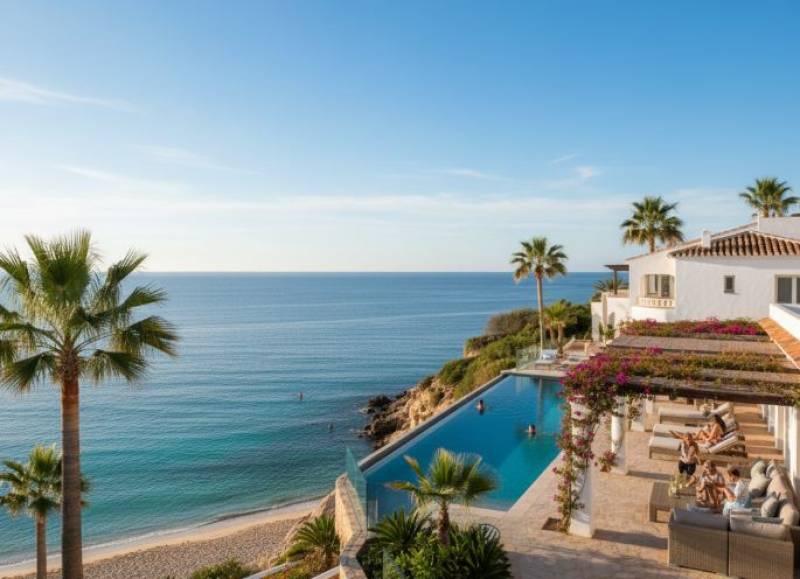
As Spain approaches the new tax year, non-resident property owners are facing a number of important updates that could affect how they manage their tax obligations. The core tax rates are staying put at 24% for non-EU residents and 19% for those from the EU or EEA, yet changes linked to EU rulings and national reforms may reshape how these taxes work, particularly for owners who live outside the EU.
For now, the usual Modelo 210 obligations remain. Anyone who owns a property in Spain that is either empty or used only by themselves must file imputed income tax for the 2024 tax year by December 31, 2025. Those who rent out their property, whether for holiday lets or long-term tenancies, must file rental income tax between January 1 and 20, 2026 for the 2025 tax year. If a property is sold, capital gains tax is due within four months of completion.
One significant update for 2025 concerns the percentage used to calculate imputed income. This rate depends on when the property’s cadastral value was last updated. Essentially, a rate of 1.1% applies if the value was revised within the past decade through a general collective valuation. If not, the rate stays at 2%. As some towns have recently undergone valuation changes, owners could see their taxable base rise or fall accordingly.
From July 1, 2025, Spain began rolling out a Single Rental Registry which requires all short-term rental properties to obtain a Rental Registration Number, even if they already have a tourist licence. Major platforms will automatically remove listings without the new registration. This measure aims to increase transparency and reduce fraudulent activity in the rental market.
There is also a potentially significant development for non-EU landlords. In July 2025, Spain’s National Court ruled that preventing non-EU property owners from deducting rental expenses may breach EU non-discrimination rules. While the decision is under appeal, it opens the possibility for non-EU owners to deduct costs such as utilities, cleaning, maintenance, insurance, management fees and certain local taxes. If the ruling is upheld, owners may even be able to claim refunds for past years, provided they have full documentation. For that reason, you are strongly advised to keep all and any receipts from now on, if you don’t already.
Adding to the uncertainty, the European Commission has begun infringement proceedings against Spain over its non-resident tax rules, particularly the imputed income tax applied to vacant or privately used properties. The Commission argues that the rules may restrict the free movement of capital, though Spain disputes this. The case may eventually reach the EU Court of Justice, but for the moment nothing has changed and non-resident owners must continue filing under the current system.
With new rental registration requirements and possible reforms to deductions on the horizon, non-resident owners would do well to stay informed and nicely organised to ensure full compliance in the year ahead.
Double Christmas bonus payment on the way for pensioners in Spain
 Christmas is practically on the doorstep now and, for better or for worse, there’s already a festive buzz in the air. Christmas decorations been mixing with the Halloween stuff in the shops for two weeks now. And you know what that means: presents to buy, get-togethers with family and friends and plenty of celebrating, which usually means a fair few euros flying out the door.
Christmas is practically on the doorstep now and, for better or for worse, there’s already a festive buzz in the air. Christmas decorations been mixing with the Halloween stuff in the shops for two weeks now. And you know what that means: presents to buy, get-togethers with family and friends and plenty of celebrating, which usually means a fair few euros flying out the door.But if you’re a retiree earning a Spanish state pension, there’s an extra reason to feel cheerful this year because your Christmas bonus is about to land, offering some much-needed help with all those seasonal costs.
Now, officially speaking, the Treasury says Christmas bonuses get paid out between December 1 and 4. But here’s the thing: most banks actually bring that date forward so pensioners can get their hands on the money at the end of November instead. It’s become a bit of a tradition really.
Seguridad Social releases the funds in early December, but banks often credit their customers’ accounts ahead of time. The same thing happens with the summer bonus, which usually arrives somewhere between June 21 and 25 depending on which bank you’re with.
This year, some banks are getting in even earlier. Bankinter and Unicaja Banco have both confirmed they’ll be making the November pension and Christmas bonus available to their customers on Friday November 21.
For those of you whose pensions are paid in 14 instalments per year, the bonus month means a double payment landing in your account. So you’ll get your usual monthly amount plus a full extra month’s payment as your Christmas bonus.
The exact date can vary from bank to bank, so it’s worth giving yours a quick ring or checking online to confirm when your pension will arrive.
What’s glove got to do with it?
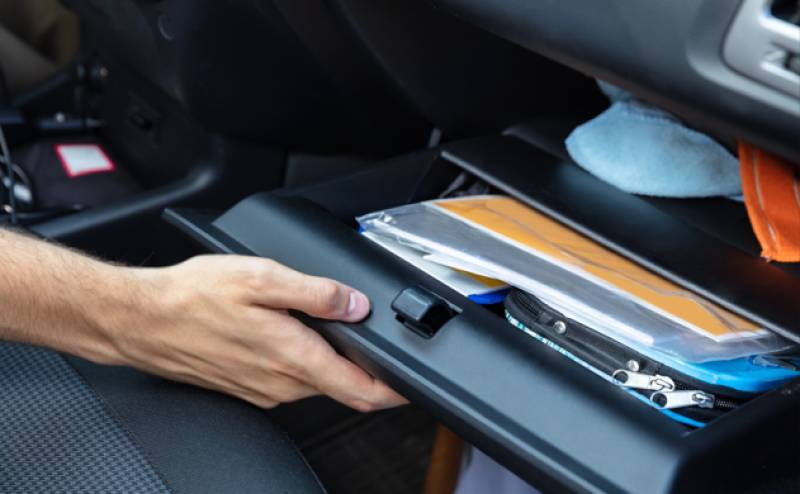
The Guardia Civil has ramped up roadside checks right across Spain and quite a few drivers have been caught off guard when officers ask to have a look inside their glove compartments to make sure vehicles are carrying the right paperwork and equipment.
Now, some reports have got drivers in a bit of a tizzy with talk of massive fines, but the reality is a lot more straightforward. Penalties only get dished out when someone’s missing mandatory documents, carrying something they shouldn’t have in the car or not meeting safety rules that are coming into force soon.
One of the main things they’re watching for is dangerous or prohibited items. If you’re carrying knives, unlicensed firearms or anything that could be classed as a weapon, you could be looking at fines of more than €600. These cases fall under Spain’s Citizen Security Law, which allows penalties of up to an eye-watering €3,000 for serious or very serious offences.
Another thing on their radar is the V16 emergency beacon. From January 2026, this small flashing light will replace those reflective warning triangles most people still use. Drivers will need to keep it somewhere easy to reach, like the glove compartment, so it can be whipped out quickly if you break down or have an accident. It’s not mandatory just yet, but once the rule kicks in, anyone without one could be hit with a fine.
The most common issue is still missing or expired documents. Every driver needs to be able to show a valid driving licence, vehicle registration certificate and ITV inspection card. Forgetting these or letting them expire can land you with a fine, though the amounts vary quite a bit.
It’s also worth remembering that the DGT now lets you store your vehicle documents digitally through its mobile app. Even so, it’s still a smart idea to carry physical copies to make roadside checks go more smoothly.
So yes, serious offences can bring fines of up to €3,000 but those cases are pretty rare. For most people, it’s enough to keep your car organised, check your paperwork is up to date and make sure any safety equipment is easy to find before you set off.
Find all the latest motoring and travel news here or join our Driving in Spain Facebook group for regular updates
The new niño on the block
 It seems there’s a new pretender to the throne threatening the crowns of our favourite supermarkets who have long held firmly to the biggest chunk of the market share. It looks like there’s no stopping Action, the latest discount superstore aiming for Spanish domination.
It seems there’s a new pretender to the throne threatening the crowns of our favourite supermarkets who have long held firmly to the biggest chunk of the market share. It looks like there’s no stopping Action, the latest discount superstore aiming for Spanish domination.The Dutch chain first pitched up in Spain back in 2022 and already has close to 100 stores dotted around the country.
Known for its rock-bottom prices, the brand is pushing ahead with its expansion by opening three new branches. The latest one’s in Málaga, following recent launches in Morón (tee-hee) and Ciudad Real.
Action’s success has been absolutely huge. Right across its 3,000 stores in 14 European countries, the company pulls in around 20 million customers each week and employs more than 65,000 people.
In Spain, Action’s being seen as a real challenger to the big names like Mercadona, Carrefour, Aldi and Lidl. Mind you, it’s not a traditional supermarket. Most of what they sell is non-food items, though you will find a few basics like sweets, coffee and seasonal treats.
Prices are famously low, with plenty of things coming in at less than €2.
The chain also keeps shoppers coming back by adding around 150 new products every week. The mix covers pretty much everything from cookware and towels to fashion, gadgets, stationery, cleaning products, personal care bits, gifts, toys and gardening tools. There’s even a pet section and a growing range of home and DIY supplies.
Action’s continuing to grow and has plans to open another 20 stores in Spain soon. Since that first Spanish shop opened in Girona in 2022, you can now find Action stores right across the country, from Galicia down to Andalucía, with the biggest concentrations in Catalonia (20 stores), Andalucía (17 stores) and the Valencian Community (16 stores). The Region of Murcia has seven stores already.
The company has also opened its first logistics centre in Illescas, Toledo, which will supply up to 210 stores across Spain and Portugal. One to watch for the future…
Murcia
We start our Murcia section this week with an update on the ongoing case of the murders of two Ecuadorian men, José Patricio Chango and Edwin Guillermo Cambal, whose dismembered bodies were discovered in a house in Camposol back in September.
This Wednesday, the Guardia Civil arrested a second suspect in connection with the murders. The first suspect, who was cuffed in Mazarrón, remains in pretrial detention following his arrest shortly after the bodies were found, and this second arrest took place in Alcantarilla, nearly 50km from Camposol. More details are surely to follow once this second suspect has been questioned and the police make their statement.
After the flooding of a couple of weeks ago left the tap water undrinkable for about ten days in Los Alcázares, San Javier and Torre Pacheco, residents of these municipalities are set to see their water bills cut. This week, Los Alcázares Town Hall and the water company Aqualia have confirmed that locals won’t be charged for the days they couldn’t drink the tap water.
The Mayor called it an “act of justice” for everyone who showed such strength and solidarity during yet another stormy setback. The discount will appear automatically on the next bill, covering both supply and sewage, though the wastewater treatment charge may still pop up as that’s managed by a regional agency, ESAMUR.
Following their lead, San Javier and Torre Pacheco announced an identical measure just a day later, and Murcia city just today, Friday. The Town Halls of two municipalities and Hidrogea, the local water supplier for the area, will also reduce October’s bills for households and businesses affected by the drinking water cuts.
For anyone still dealing with the fallout, there are information desks open at the Town Hall, where residents and businesses can get advice and help, and even file claims for damages in some cases. If you think this may apply to you, head to your local town hall building to enquire. You’ve got nothing to lose!
While the town councils have been busy addressing the fallout from the storm still, locals have once again shown how resilient and generous they can be. When the annual Día del Caldero celebrations on Los Alcázares beaches had to be cancelled because of flood damage, the residents of the Albatros Residencial urbanisation brought the event home, hosting their own Caldero day on October 12 within the resort grounds. A full 99 people turned out on the day, and together they raised a cracking €3,200 for four local charities, a record total that builds on previous years’ efforts.

The money will be split equally between MABS cancer support, the Los Alcázares ‘No Child Without a Toy’ campaign, the Asociación Hippocampus seahorse conservation project and LIPS Rescue dog shelter. Some donations have already been handed over, while others will follow soon, but if you still fancy donating a little something, there’s still time. They’re always willing to accept donations!
Also generously donating money is the Region of Murcia government, which has launched a scheme offering grants of €200 to help young people with the cost of driving lessons and test fees, to help them get on the road. Around 2,570 applicants are expected to benefit from the initiative, which the Region’s President Fernando López Miras announced on TikTok.
His rationale behind the scheme, he said, was ultimately to get people into employment, describing a driving licence as essential for “independence, freedom and finding a job”. Well, that’s a novel way to try to get people into work – putting more learner drivers and people who are new behind the wheel onto the roads! One imagines it’s especially good for Uber drivers, truckers and other similar jobs.
Now, from modern wheels to ancient feet, scientists have made a fascinating discovery along the Murcian coast. Fossilised footprints found in Calblanque and Torre de Cope reveal that enormous straight-tusked elephants used to roam the Murcia coastline around 125,000 years ago.
The prints, some measuring up to half a metre across, were left by an adult elephant over two metres tall and weighing around 2.6 tonnes. It seems these gentle giants shared the coastline with prehistoric wolves, deer and even wild horses, painting a picture of a lush, forested landscape that once stretched down to the sea.
Finally, if you’re looking for something to do in Murcia this weekend, you’ve got the Champions (UK) plc European Senior Masters tournament at La Manga Club every day until Sunday. In our capacity as sponsors, Murcia Today even gave away over 100 free tickets to lucky competition winners, for what is already shaping up to be four days of top-class golf. Hosted by Ryder Cup hero Peter Baker, the event features golf legends like Paul McGinley, Philip Price, Jamie Donaldson and Stephen Gallacher, plus a splash of celebrity sparkle from football icons Gordon Strachan and Kenny Dalglish. If you fancy it, there’s still time to buy tickets here: www.europeanseniormasters.com/tickets
If golf isn’t quite your thing, there’s always the welcoming atmosphere of La Palmera Bar & Grill in Estrella de Mar, which has a line-up of entertainment for November that looks as good as ever, paired with their signature smoked meats, hearty roasts and daily specials… the perfect way to round off a busy week!
See our EVENTS DIARY for more events and activities coming up soon in the Region of Murcia:
Spain
Fuel prices in Spain are finally giving drivers a bit of a breather, dropping to their lowest point since mid-June. Petrol has fallen for the fifth week in a row and diesel for the third, bringing the average litre of diesel down to €1.394 and petrol to €1.464.
That means filling up a typical 55-litre diesel tank now costs around €76.67, while petrol comes in at about €80.52.
It’s not exactly cheap, but still a little easier on the wallet than it was this time last year.
So far this year, petrol is about 4% cheaper than it was at the end of 2024 and diesel has dropped by just over 3%. It’s a small but welcome relief as we head deeper into autumn, especially after months of stubbornly high prices.
Unfortunately, though, the good news might not last. Experts are warning that by 2027, we could be paying around €2 a litre for petrol, a rise of about 35% from today’s prices. The reason lies in a new EU carbon trading scheme that aims to phase out petrol and diesel cars altogether over the coming decade.

The plan is to make traditional fuels more expensive until both the cars that use them and the stations that sell them are gone for good. Spain has backed the EU target to end sales of new petrol and diesel vehicles by 2035, but that transition could get bumpy for drivers in the meantime.
Adding to the pressure, Brussels is pushing Spain to scrap the tax advantage that keeps diesel cheaper than petrol, which would bring the two prices closer together even before the carbon scheme begins.
The reality on Spanish roads, though, is still far from the EU’s electric vision. Around 60% of cars in Spain run on diesel, another 34% on petrol and electric vehicles make up only a tiny fraction.
To make matters trickier, the average car in Spain is now 14 and a half years old, one of the oldest fleets in Europe. Many households simply can’t afford the jump to a new, expensive electric car, no matter how green the incentives sound.
Right now, those €2-a-litre figures are predictions rather than certainties, so we will have to wait and see how it all plays out over the next year or two.
Staying with money woes, I’m afraid, as a new report has revealed, Spain’s wage gap has almost disappeared, but not for the right reasons. According to research by the Juan de Mariana Institute, the difference between Spain’s minimum wage and the most common salary has shrunk to just 3%.
That might sound like progress, but the study says it’s actually a sign that middle incomes in Spain are falling rather than low wages rising.
Between 2018 and 2023, Spain’s minimum wage shot up from around €10,000 to €13,370, while the typical salary fell in real terms from nearly €18,000 to about €13,800. The gap that once stood at more than €8,000 has narrowed to barely €400.
The Institute argues that this is the result of stagnant productivity, high inflation and weak economic growth. While the lowest salaries have increased by decree, middle earners have lost purchasing power, creating what the report calls an “impoverishing ceiling”.
In other words, when the lowest and most common wages become almost the same, there is less incentive to upskill or take on more responsibility.
The figures vary by region, but the pattern is widespread. In 42 of Spain’s 50 provinces, the minimum wage now exceeds 60% of the average salary, and in many places it is closer to three quarters. The areas feeling it most include Ávila, Zamora, Badajoz, Murcia and Alicante, where wages were already among the lowest in the country.
Extremadura tops the list, with the minimum wage representing nearly 73% of the average local income, followed closely by the Canary Islands, Andalucía and Castilla y León.
The Institute estimates that as many as 210,000 jobs have already been lost since 2019 as a result of rapid wage increases, particularly in sectors such as hospitality, retail and cleaning, where margins are tight and wages were already low. That figure could reach 270,000 by the end of this year.
The authors say Spain does need higher pay, but argue that forcing it through government decree is not the answer. Instead, they call for a stronger focus on productivity and growth to create real, sustainable improvements in living standards.
Alicante
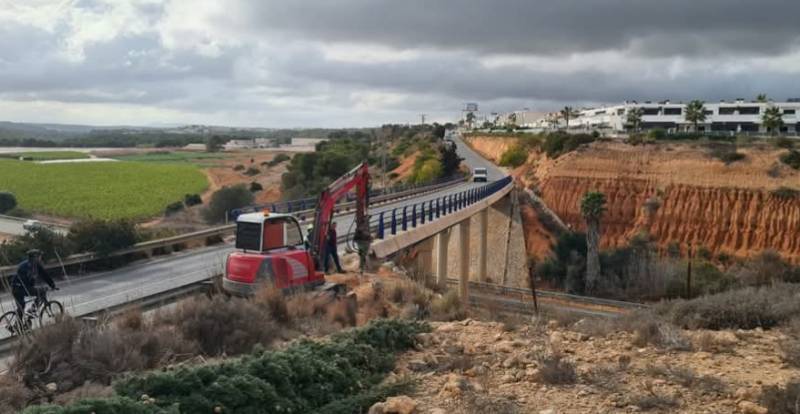 It’s been a long wait for anyone hoping to see a footbridge built over the busy road linking Lomas de Cabo Roig with Calle Creus and the rest of Orihuela Costa. After seven months of silence and around 20 years of delays, there’s finally some movement. A company has now been brought in to design the long-promised bridge, so work could finally be inching closer.
It’s been a long wait for anyone hoping to see a footbridge built over the busy road linking Lomas de Cabo Roig with Calle Creus and the rest of Orihuela Costa. After seven months of silence and around 20 years of delays, there’s finally some movement. A company has now been brought in to design the long-promised bridge, so work could finally be inching closer.The company, Anta Ingeniería Civil, has been awarded a contract worth €72,600 to design the project. They’ve got two months to complete the plans, which will then need approval from the Alicante Road Authority.
That review process could take some time, especially if any tweaks or changes are requested. Only after that will Orihuela City Council tender for another company to actually build the bridge, which could take a further nine to twelve months.
If everything runs smoothly, which locals know is never guaranteed, construction could realistically start towards the end of 2026 or early 2027. The building phase is expected to last around four or five months once the first spade finally hits the ground.
The bridge will be open to both pedestrians and cyclists, featuring a walkway at least 1.8 metres wide alongside a two-way cycle lane measuring 2.5 metres. LED lighting will also be installed to keep it well-lit and energy efficient.
Elsewhere in La Zenia, customers enjoying a quiet afternoon drink at Alejandro’s bar got quite a scare on Wednesday when a car suddenly flipped onto its side right in front of them. The accident happened around 3.15pm on the Villamartín road, near the roundabout at the 52-kilometre mark of the N-332.
The driver, a young woman, was trapped inside her overturned car and had to be rescued. Firefighters from the Provincial Fire Consortium sent two crews, and they were joined by paramedics and local police officers from Orihuela.
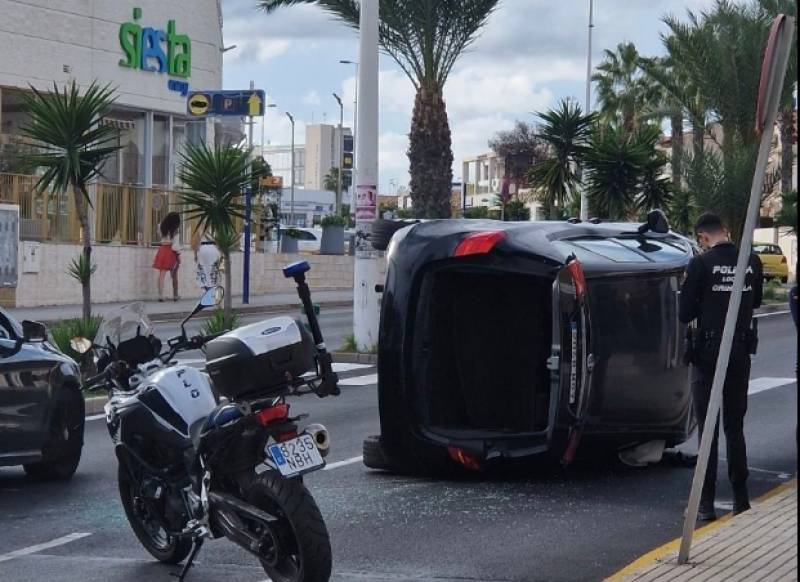 The rescue operation took almost an hour but by around 4pm, the woman had been safely freed from the vehicle.
The rescue operation took almost an hour but by around 4pm, the woman had been safely freed from the vehicle.Traffic was partially disrupted for a while but one lane stayed open, allowing cars to pass through slowly. It all unfolded during the busy afternoon period, so drivers faced some short-term delays in the area.
Police are still investigating what caused the crash, though it doesn’t appear that any other vehicles were involved.
And in Javea, tragedy struck early last Sunday morning when a 50-year-old British man was found dead between two parked cars. The discovery was made around 7.45am on Avenida Trenc d’Alba and emergency services quickly arrived on the scene.
Police confirmed that there were no immediate signs of violence, although the investigation is ongoing and a postmortem will determine the cause of death.
It’s not yet known whether the man was living in the area or just visiting, but the British Consulate has been informed.
The authorities are urging anyone who might have information to come forward as they continue their investigation.
Andalucía
It has been a busy week in Andalucía’s ongoing fight against crime, with authorities making significant headway in dismantling some of the region’s most dangerous criminal networks.
The Policía Nacional in Málaga struck hard in what officials are calling a record-breaking month of raids against organised crime. Over the past 30 days, seven criminal gangs were smashed, resulting in 55 arrests connected to a wave of serious crimes including kidnappings, shootings and large-scale drug trafficking.
 The police seized nearly nine tons of hashish and cocaine, alongside a cache of 37 firearms (some military-grade!), €150,000 in cash and 40 vehicles.
The police seized nearly nine tons of hashish and cocaine, alongside a cache of 37 firearms (some military-grade!), €150,000 in cash and 40 vehicles.This latest crackdown is part of the Costa del Sol Plan, a year-old initiative aimed at crippling drug networks and violent groups. Deputy Government Delegate Javier Salas praised the police for their “great work” and warned criminals that nobody causing harm will be allowed to “get away with it”.
Meanwhile, the Policía Nacional in Granada arrested a 66-year-old Swedish man wanted in Norway for sexual abuse and fraud.
The man’s downfall came down to a simple mistake: he regularly visited the same café for breakfast on the outskirts of Granada. Alert officers used this predictable habit to stake out the café and quietly detain him early one morning. Identification was swiftly confirmed using his ID and Europol data, and he was brought before the courts the following day.
This arrest is yet another example of how increasing European cross-border cooperation is making it harder for criminals to evade justice anywhere on the continent.
Ending on a lighter note, Almería is strengthening its international connections with the announcement of a new direct flight to East Midlands Airport in the UK. The news was announced at the World Travel Market (WTM), which takes place in London this time each year, and where travel industry hotshots regularly reach big deals for the year ahead.
The Jet2 route, which is set to launch in March 2026, will operate through to October and expand Almería’s growing links with Britain, targeting the rising British market, which is expected to grow by 31% this year.
This new flight will add to the existing eight UK connections, which include London, Manchester, Birmingham, Leeds, Bristol and Liverpool. Ángel Escobar, vice-president of the Provincial Council, said this development confirms “Almería’s thriving appeal as a destination for UK travellers.”
Meanwhile, Vueling is set to boost domestic air links by adding three weekly flights to Barcelona, offering travellers more flexibility. Not bad for the traditionally out-of-the-way Almería.
Keep tuned for more news coming out of the WTM, such as additional flights at Málaga Airport (as if they needed any more), and other Spanish airports.
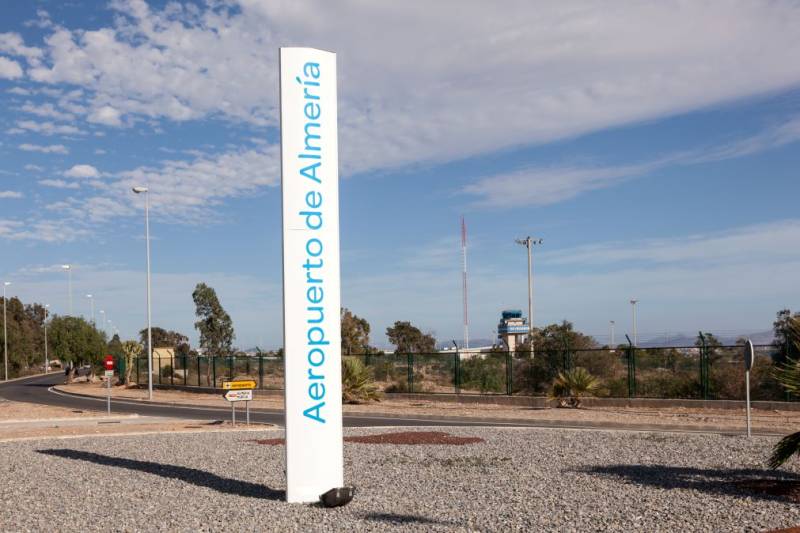
You may have missed…
- Murcia photo of the month November 2025.
Here’s the top image of the month taken by the Los Alcázares Digital Camera Club (LADCC). - The Llíber property scandal: A summary of two decades of deception.
For nearly two decades, the small Spanish village of Llíber in Alicante was at the centre of one of the most extensive and damaging property frauds ever to target foreign buyers. This is the story of how hundreds of expatriates, mostly elderly couples seeking a dream retirement home in the sun, had their life savings systematically stolen in a sophisticated and calculated scheme involving corrupt officials, unscrupulous developers and complicit lawyers, and of their ongoing fight for justice... - British man found dead naked in Mallorca sparks investigation.
A 64-year-old British man’s body was found and completely naked in an open field on a farm in Santanyí, Mallorca, late on Monday. - Did you know? You can boost your existing home solar energy system with more modern, powerful batteries and here’s how.
Those with solar panels on their home may not know that it’s possible to give them a new lease of life with the latest technology, such as advanced microinverters and batteries to boost efficiency and save energy. - Read the November edition of Home & Living magazine online now.
The November issue of Home & Living magazine is ready to read now, either online or by picking up a copy in any of the locations mentioned in the link above.
And that’s it for another week. Thanks for reading and we’ll be back next week.
See you then!
Contact Murcia Today: Editorial 000 000 000 /
Office 000 000 000
















